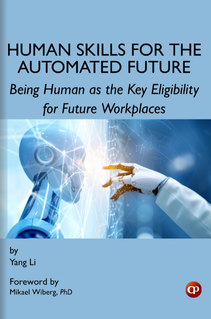The Future of Education and Its Role in Promoting Human Skills in an AI World

by Yang Li
Academic Researcher & K-12 Consultant, Jiangsu-Nanjing 210023, China.
10.46679/9788196780586ch06
This chapter is a part of: Human Skills for the Automated Future: Being Human as the Key Eligibility for Future Workplaces by Yang Li
ISBN (Ebook):978-81-967805-8-6
ISBN (Softcover Print):978-93-49926-23-3
© CSMFL Publications & its authors.
Published: May 15, 2025
Abstract
It is imperative that the education system evolves in accordance with contemporary requirements, enabling it to address the challenges posed by artificial intelligence (AI) and harness its benefits for the prosperity of the next generations. This chapter critically analyze the required necessary revisions in curriculum and pedagogical methods to facilitate students’ acquisition of necessary skills for meeting these challenges. The chapter advocates for a reevaluation of the curriculum to address the needs of the future workplace. It proposes a shift away from rote learning and outcomes-based standardized testing, advocating instead the value of skills complementary to AI—specifically, critical thinking, problem-solving, creativity, collaboration, and communication. The proposed curriculum revisions incorporate aspects of project-based learning, computational thinking, and the development of inquisitiveness, adaptability, and lifelong learning. Essentially, this approach reaffirms the notion that educators would transition into facilitators, guiding students in the effective utilization of AI tools. This implies that the teacher’s role remains indispensable. According to this chapter, AI-powered learning platforms could be integrated into personalized education; AI could be employed in formative assessment; and teachers could be empowered to utilize AI as a pedagogical tool. This suggests that AI is considered a supportive technology that would promote learning rather than supplant the teaching and guiding role.
The chapter concludes by explaining the importance of promoting a growth mindset in students to prepare them for a lifelong learning. In the contemporary time, where acquired skills are more susceptible to obsolescence, it is critically important to base a foundation for continuous learning and adaptation to new situations. The chapter further explores approaches that would encourage students to embrace challenges and perceive learning as an ongoing process. In doing so, it aims to instill a love of learning and develop independent learning abilities. This will prepare students for a future in which continuous skilling and re-skilling through learning will be not merely an option but a necessity for survival.
Keywords: Artificial Intelligence (AI), Future of Education, Curriculum Design, Critical Thinking, Problem-Solving, Creativity, Collaboration, Communication
References
- OECD. (2021). Adapting Curriculum to Bridge Equity Gaps. OECD. https://doi.org/10.1787/6b49e118-en
- Aggarwal, D. (2024). Exploring the Scope of Artificial Intelligence (AI) for Lifelong Education through Personalised & Adaptive Learning. Journal of Artificial Intelligence,Machine Learning and Neural Network (JAIMLNN) ISSN: 2799-1172, 4(01), 21–26. https://doi.org/10.55529/jaimlnn.41.21.26
- Asirit, L. B. L., & Hua, J. H. (2023). Converging perspectives: Assessing AI readiness and utilization in Philippine higher education. Polaris Global Journal of Scholarly Research and Trends, 2(3), 1–50. https://doi.org/10.58429/pgjsrt.v2n3a152
- Bye, R. T. (2018). A Flipped Classroom Approach for Teaching a Master’s Course on Artificial Intelligence. Communications in Computer and Information Science, 246–276. https://doi.org/10.1007/978-3-319-94640-5_13
- Eaton, E. (2017). Teaching Integrated AI through Interdisciplinary Project-Driven Courses. AI Magazine, 38(2), 13. https://doi.org/10.1609/aimag.v38i2.2730
- Hanila, S., & Alghaffaru, M. A. (2023). Pelatihan Penggunaan Artificial Intelligence (AI) Terhadap Perkembangan Teknologi Pada Pembelajaran Siswa Sma 10 Sukarami Kota Bengkulu. Jurnal Dehasen Mengabdi, 2(2), 221–226. https://doi.org/10.37676/jdm.v2i2.4890
- Kumar, L. (2023). Revolutionizing Education: Artificial Intelligence’s Pioneering Role in Shaping Tomorrow’s Scholars. International Journal of Multidisciplinary Research in Arts, Science and Technology (IJMRAST), 1(2), 1–7. https://doi.org/10.61778/ijmrast.v1i2.6
- Lee, I., & Perret, B. (2022). Preparing High School Teachers to Integrate AI Methods into STEM Classrooms. Proceedings of the AAAI Conference on Artificial Intelligence, 36(11), 12783–12791. https://doi.org/10.1609/aaai.v36i11.21557
- Li, B., & Peng, M. (2022). Integration of an AI-Based Platform and Flipped Classroom Instructional Model. Scientific Programming, 2022(2536382), 1–8. https://doi.org/10.1155/2022/2536382
- School, D. I. (2023, July 28). Empowering Education: The Flexibility and Adaptability of Curriculum to Meet Learners’ Needs and…. Medium. https://medium.com/@diyesinternational/empowering-education-the-flexibility-and-adaptability-of-curriculum-to-meet-learners-needs-and-3c257883b5fa
- Stace, C. (2020, November 25). How to turn your students into lifelong learners. Resources for English Language Learners and Teachers | Pearson English. https://blog.pearsoninternationalschools.com/how-to-turn-your-students-into-lifelong-learners/
This book is available worldwide via EBSCOhost Academic Collection, EBSCO E- books, Google Play Books, Amazon, World Cat Discovery Service/OCLC, CSMFL Bookstore, and 200+ book resellers and academic content vendors.
Statement on Publication Ethics
We, at CSMFL Publications, are committed to ensure the unbiased and transparent publishing, and upholding the high standards of editorial integrity in our publications. To know more, please read our Statement on Publication Ethics, Editorial Integrity & Misconduct